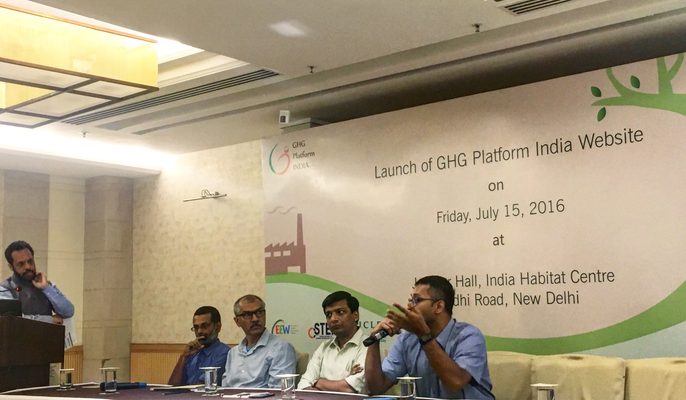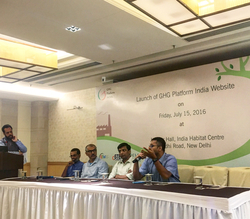Civil society comes together to launch India's first independent GHG emission estimates

India’s first civil society platform for GHG estimation and analysis – GHG Platform India – was launched on 15th July, 2016 in New Delhi. The platform provides national estimates for GHG emissions from the energy, industry, waste and agriculture, forestry and other land use (AFOLU) sectors from years 2007-2012 by accounting CO2, CH4 and N2O gases. These estimates are publicly available on the platform website allowing users to view and download data sets.
The platform is a collective initiative of eminent institutions such as Council on Energy, Environment and Water (CEEW), Center for Study of Science, Technology and Policy (C-STEP), ICLEI Local Governments for Sustainability South Asia, Vasudha Foundation and World Resources Institute (WRI) India. The initiative also includes other sectoral experts. The platform was jointly conceptualised by Shakti Sustainable Energy Foundation and Vasudha Foundation, which also acts as the Secretariat for the platform. It draws its inspiration from a similar civil society initiative in Brazil – System for Estimation of Emissions of GHG (SEEG).
To ensure transparency, the website has listed all methodologies used for analysis. Moreover, all the estimates are available in an easily downloadable format. The medium is expected to be a valuable tool for the government, think tanks, civil society, the public and media to understand development trends and track emissions. The data will also be useful to drive strategic decisions around GHG reduction and climate-friendly policies.
Dr Arunabha Ghosh, CEO, CEEW said, “Council on Energy, Environment and Water (CEEW) has developed an independent estimate of India’s industrial emissions, using a bottom-up approach by assessing a wide range of fuel use, industrial process, and product use from more than 200,000 industrial units. For a more robust and comprehensive GHG inventory assessment for industries, there is a need for an industry-wide survey focusing on energy consumption and bringing hitherto unregistered units into the fold of this exercise. This degree of rigour and transparency is essential if India has to defend its interests at climate negotiations.”
Objectives of building the database include: filling data gaps, enhancing data accessibility, informing policy dialogue, showcasing India’s actions on climate change and creating a repository of data that can be used by various ministries, departments and stakeholders.
Mr. Krishan Dhawan, CEO of Shakti Sustainable Energy Foundation asserted that the launch of the website marks an important milestone for the platform as well as civil-society collaboration in the field of climate change. “The transparency that the platform has been able to instil in preparing the emission estimates vastly increases their utility and robustness. It is expected that institutions all over India will use these estimates to better inform policy choices and design solutions that mitigate climate change,” he said.
It is also envisaged that the data will be updated on a regular basis along with other key information and the data would help analysts in data-driven decision making.
“C-STEP has analysed emissions from energy production and use in the electricity generation, transportation, other (residential, commercial, agriculture and fisheries) and fugitive emission sectors. Together these constitute over 60 percent of India’s GHG emissions. The activity data and other assumptions have been made transparent and public sources of information have been used. The exercise forms the basis to measure India’s climate performance and stimulate data-driven policy decisions,” said Mr. Mohd. Sahil Ali, Research Scientist from the Center for Study of Science, Technology & Policy. He further gave an example of the organisation’s analysis that shows that despite all the renewable addition, emission intensity (kgCO2e/kWh net generation) of India’s electricity sector has increased between 2006 and 2013, owing to high growth in relatively less efficient fossil-based captive electricity generation.
Going forward, the platform proposes to provide sub-national GHG emission estimates while simultaneously expanding the time-series for the national estimates. The platform will also undertake relevant analytical assessments to inform policy design and evaluation.
Mr. Emani Kumar, Deputy Secretary General – ICLEI (Global) and Executive Director – ICLEI South Asia said, "Through this freely accessible public platform, we are happy to share the GHG emission estimates for the waste sector, prepared by ICLEI South Asia. In the waste sector, treatment and discharge of industrial wastewater contributes to 62 percent of GHG emissions from the country’s total waste while domestic wastewater and solid waste disposal contribute 22 percent and 16 percent respectively. The disaggregated detailed information made available through this platform is useful to prioritize technologies for waste management and to identify those sectors which need our immediate attention.”
Through this database, the alliance seeks to complement existing efforts of the Indian government, such as the process of submitting National Communications to the UNFCCC, by helping address existing data gaps and data accessibility issues, extending beyond the scope of national inventories, and increasing the volume of analytics and policy dialogue on India’s GHG emissions sources, profile, and related policies. Many experts at the event also believed that this effort it holds greatere relevance after the Paris Climate Agreement and submission of India’s Nationally Determined Contribution (NDC).
Mr. Srinivas Krishnaswamy, CEO of Vasudha Foundation said, “We are in an era where we have to dig deep into different sectors for mitigating our carbon emissions and this database is an essential first step, for us to get an understanding of emissions by sector in detail, particularly, the sub-sector information. I am happy that, this initiative of civil society groups to make available sector specific emission estimates at a more granular level, for a time series of years, is made available for easy access.”
Mr. Vivek P. Adhia, Sr. Associate, Climate – WRI India said, “The initiative has been key to facilitating a strong and robust national emission estimations process. With greater transparency built-in by using publicly available data sources, this platform supports increased collaboration between civil society and policy makers to effectively manage overall greenhouse gas emissions.”
The launch of the website was followed by an expert panel discussion that underscored the challenge of ensuring accurate and credible GHG emission data sets to better inform policy action. Panellists also emphasised the importance of enhancing user engagement, which, as indicated by the consortium, will be a key effort of the platform here on.




